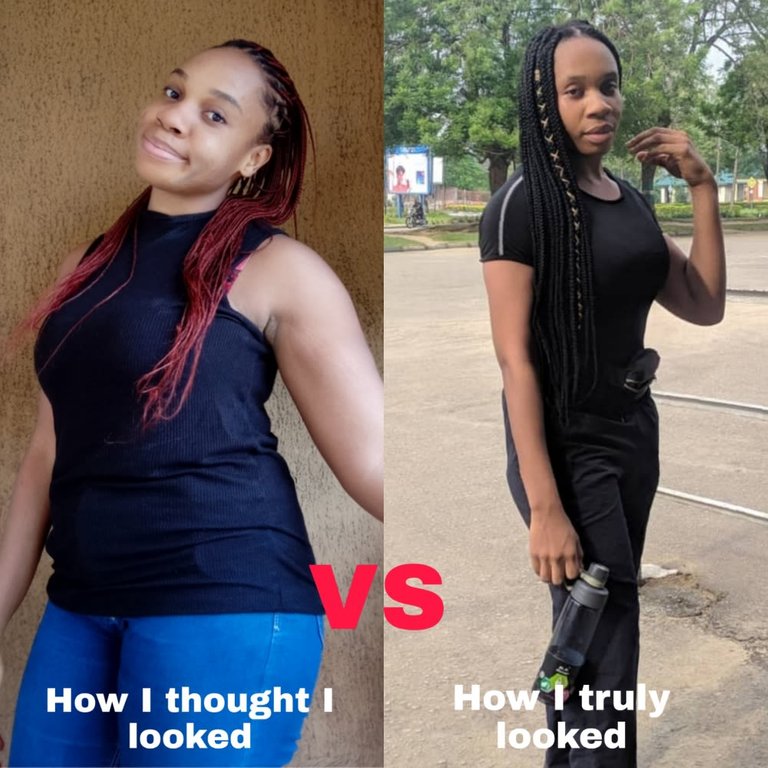SURVIVING BPDY DYSMORPHIC DISORDER

Image source (Mine)
you intensely focus on how you look, repeatedly checking the mirror for long hours There are mirrors all over my house so it didn't help matters. Even a plate or spoon would do if a mirror wasn't available or a puddle of water!!
Constantly seeking the opinion of others concerning that insecurity. Example, does this dress make me look fat
When this perception and the obsessive behavior causes significant distress and affects ability to carry out daily activities.
In my case restrictive eating and avoidance of social functions to avoid eating.
Starving for days and passing out. This happened while I was standing during a lecture, next thing I was on a chair being resuscitated.Seeking numerous fixes or solutions to boost your ego and tone down the feeling of being flawed. Even after a temporary satisfaction, it returns with you looking for more flaws and seeking other means to correct them
In my case, after I lost 15kg, it didn't stop my obsession about my body size. My BDD stopped for a while then came back with full force. I still viewed myself as plus sized and j still wanted to lose more.
This went on for years till I developed a severe eating disorder and had to seek help.
Muscle dysmorphia also called bigorexia where the person is believes that his muscles are not big enough.
Signs and symptoms of body dysmorphic disorder include:
Extreme perception that a part of your body is flawed which others can't see. The commonest body parts affected include
Face (nose, pimples, dark spots)
Hair
Skin complexion
Breast size
Muscle size and tone (Bigorexia)
Size of external genitalia
Strong belief that you have a deformity in your appearance that makes you ugly and unpleasant
Feeling that people would specifically notice the perceived flaw and mock you because of it
Behaviour or activities aimed at fixing or hiding the perceived flaw that are difficult to resist or control, such as frequently checking the mirror, grooming or skin picking
Making numerous attempts to hide perceived flaws in my case, bigger clothes to hide perceived "body fat"
Constant comparison with other people eg Instagram models
Constantly seeking opinion of others on your appearance
Avoidance of social gatherings
Any management of mental health issues involves a lot of talking. Talk first before the pills. In psychiatry, every disorder is treated using the biopsychosocial approach.
Bio referring to the biological and physiological component of the disease that is the disease at the cellular and tissue level for example genetics and neurodevelopmental aspect so the focus here would be on drug therapy
Psychosocial referring to the aspect that affects the mind and psych. This is where the psychologists come in with their cognitive behavioural therapy.
In CBT, the negative perceptions about your body image are replaced with positivity. It is done by an experienced mental health specialist and it has been proven to be very effective in management of BDD especially when combined with medicTions
Biological treatment
Medications
The food and drug administration has not approved any medications for treatment of BDD however the following drugs are used to ameliorate and they can be effective
- Selective serotonin reuptake inhibitors (SSRIs).
This drug is an antidepressant. Serotonin is a chemical substance produced in the body. In layman's language, the happy hormone. This drug increases the levels of this happy hormones as a result they may help control those negative perceptions and obsessive behaviors
You may ignore this condition till it gets complicated. That's when most people seek help.
- Major depression
- Mood disorders
- Eating disorder
- Substance abuse
Don't get this disorder wrong. Most people are not happy with the way a part of their body looks but when this thought becomes excessive and is affecting the day to day activities. That's when we refer to this condition as body dysmorphic disorder. Nobody has perfect body and it's okay to want to modify or enhance a part. Striving to become a better version of ourselves doesn't equate to body dysmorphia
https://www.wikihow.com/Recognize-Body-Dysmorphic-Disorder?amp=1
https://www.mayoclinic.org/diseases-conditions/body-dysmorphic-disorder/symptoms-causes/syc-20353938
Congratulations @stormz-y! You have completed the following achievement on the Hive blockchain and have been rewarded with new badge(s):
Your next target is to reach 20 posts.
You can view your badges on your board and compare yourself to others in the Ranking
If you no longer want to receive notifications, reply to this comment with the word
STOPTo support your work, I also upvoted your post!
Check out the last post from @hivebuzz:
I guess this kind of disorder would be common more in females than males. Personal experiences have shown that females have the tendency to fret over little things.
How you think you look above actually looks like a better version of you as far as aesthetic is concerned. This is my personal opinion though. I love my women with a bit of flesh, really.
Very common among females, most don't even know they have it. I didn't look bad when I was big but I just saw myself as obese. BDD even goes beyond being insecure. Right now, I don't even care..lol. Anything goes, moderation is key
Thanks for your contribution to the STEMsocial community. Feel free to join us on discord to get to know the rest of us!
Please consider supporting our funding proposal, approving our witness (@stem.witness) or delegating to the @stemsocial account (for some ROI).
Please consider using the STEMsocial app app and including @stemsocial as a beneficiary to get a stronger support.
Your content has been voted as a part of Encouragement program. Keep up the good work!
Use Ecency daily to boost your growth on platform!
Support Ecency
Vote for Proposal
Delegate HP and earn more
Thank you for stopping by!!